
Opossums are members of the marsupial order Didelphimorphia endemic to the Americas. The largest order of marsupials in the Western Hemisphere, it comprises 126 species in 18 genera. Opossums originated in South America and entered North America in the Great American Interchange following the connection of North and South America.

The brown-eared woolly opossum, also known as the western woolly opossum, is an opossum from South America. It was first described by German naturalist Ignaz von Olfers in 1818. The opossum is characterized by a brown to reddish brown coat and similarly colored limbs, yellow to orange underbelly, hairless, brown ears with a hint of pink, and a tail furred on the back for up to half of its length. The brown-eared woolly opossum is nocturnal, solitary and omnivorous. The IUCN lists it as least concern.
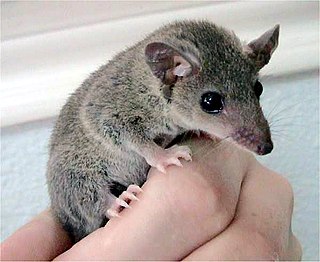
Monodelphis is a genus of marsupials in the family Didelphidae, commonly referred to as short-tailed opossums. They are found throughout South America. As of January 2019, the most recently described species is M. vossi.

The northern red-sided opossum or the Guianan short-tailed opossum, Monodelphis brevicaudata, is an opossum species from South America. It is found in Bolivia, Brazil. French Guiana, Guyana, Suriname and Venezuela.
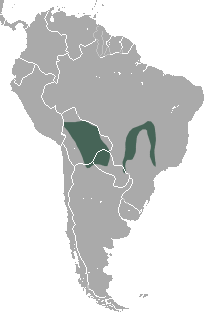
The pygmy short-tailed opossum, scientifically named Monodelphis kunsi, is an opossum species from South America. M. kunsi is a marsupial from the family Didelphidae of the order Didelphimorphia. Although it is a marsupial, it lacks the characteristic pouch that is often associated with this order. It is found in Argentina, Bolivia, Brazil and Paraguay. M. kunsi is considered a smaller species within the family Didelphidae, which is why it is named a pygmy opossum. The young are referred to as 'joeys'. The females are referred to as 'Jill,' and the males 'jack'. It was thought to have been endangered in 2001, but has since been moved to least concern by the International Union for Conservation of Nature.

The southern red-sided opossum is an opossum species from South America. It is found in Argentina, Brazil and Paraguay.
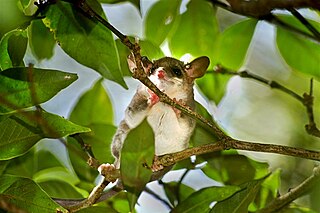
Marmosops is a genus of Neotropical opossums of the family Didelphidae. The genus was originally treated as a subgenus from the genus Marmosa rather than having their own classification. This was changed in 1989 by Gardner and Crieghton, who officially separated the group and made them their own genus. The mix-up between to genera Marmosa and Marmosops was common due to the similar appearances including size and other external features. However, the two groups differ significantly in their integument and in the arrangement of their skull and dentition. The dentition is similar in morphology between the two groups, with the exception of the deciduous lower third premolar varying from one genus to the next. The similarity between the two continues to cause the genus Marmosops to be frequently misidentified due to the lack of knowledge regarding the species along with the overlooked traits that help separate them from other opossums. The Marmosops are also commonly confused with the genus Gracilinanus, but this is quickly ruled out by a large number of differing characteristics. These differences include the arrangement of their digits, caudal scales, and the central hair on the scales changing from a three hairs per follicle to many more. This causes the hair of the Gracilinanus to be thicker and has also found to be heavily pigmented. The last group commonly confused with Marmosops is known as the genus Thylamys. These animals have a contrasting dorsal body pelage and the taxa are actually quite different.
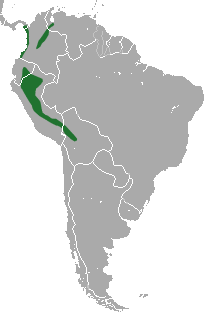
The sepia short-tailed opossum is a species of opossum in the family Didelphidae found in Colombia, Ecuador, Panama, Peru and Venezuela.

Osgood's short-tailed opossum is a species of opossum in the family Didelphidae. It is found in Bolivia and Peru. Its natural habitats are subtropical or tropical moist lowland forest and subtropical or tropical dry lowland grassland. It is threatened by habitat loss. The opossum is named after American zoologist W. H. Osgood.
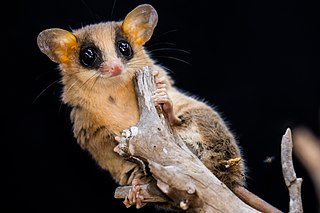
Gracilinanus is a genus of opossum in the family Didelphidae. It was separated from the genus Marmosa in 1989, and has since had the genera Cryptonanus, Chacodelphys, and Hyladelphys removed from it.

The Didelphinae are a subfamily of opossums consisting of 15 genera and 123 species. Specimens have been collected throughout the Americas, but are predominant in South and Central America.

The Amazonian red-sided opossum is a South American opossum species of the family Didelphidae, formerly viewed as part of M. brevicaudata. It is found in Bolivia, Brazil and Peru, where it inhabits the Amazon rainforest. It is omnivorous, nocturnal, and primarily nonarboreal.
The Peruvian short-tailed opossum is a species of marsupial in the family Didelphidae.It is found in Bolivia and Peru.
In mammals, ungual tufts are tufts of hairs at the base of claws of the forefeet and hindfeet. Their presence has been used as a character in cladistic studies of the Cricetidae, a large family of rodents.
The Saci short-tailed opossum, also known as gnome opossum, is a species of opossum endemic to the rainforests of Brazil.
Handley's short-tailed opossum is a species of mammal in the family Didelphidae. It is only known to exist in its type locality in Peru, and more recently in Brazil.











